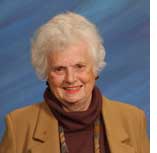Receiving an upsetting diagnosis and the six sequential reactions that follow
By Natasha Josefowitz, Ph.D.

LA JOLLA, California — Recently I noticed that things were getting a bit blurry, so I went to the Shiley Eye Institute at UC San Diego to have it checked out. Guess what? Dr. William Freeman, Director of the Jacobs Retina Center, said I have macular degeneration! He was helpful in explaining what it is and the treatment for it, trying to be reassuring, but it didn’t sound good. I have the dry kind in my left eye and the wet kind in my right.
I am 90 years old and often wondered which of my organs would fail first. In my age group whatever doesn’t dry out, leaks. Little did I know that my first failed organ would be leaking blood vessels in my eye! “Intra-retinal fluid hemorrhaging in my retina.”
When things like this happen to me, I become interested in observing myself to study my reactions to the news, assuming that I am not the only one to react this way and hoping that it might be helpful to others. The stages of reactions I went through upon receiving this upsetting diagnosis:
Stage 1—Shock: Somehow this does not fit the image I have of myself as invulnerable. It’s hard to believe that what I have seen happen to others is now happening to me. There is an element of fright; I am scared of the unknown.
Stage 2—In a funk! Feeling sorry for myself. On my way home I bumped into a couple of friends; I was very teary-eyed as I told them my bad news.
Stage 3—Catastrophising: Worst-case scenario—I’m going to lose my sight; I will go blind. There’s a white cane in my future. I am a writer, a researcher; I read a lot. This is the end of my productive life!
Stage 4—Research: Checking out WebMD and Mayo Clinic online, talking to friends who have it…gathering information. Looking into available resources such as equipment that magnifies print, books on tape, speech recognition software on computers (none of which I will need in the foreseeable future).
The incredible luck is that I live next to some of the top eye-care facilities in the world—the Shiley Eye Institute, the Joan and Irwin Jacobs Retina Center, and the Hamilton Glaucoma Center—so I could not be in better hands. The scientist who discovered the substance that causes the leaky blood vessels is Napoleon Ferrara, MD, who also invented the most commonly used class of drugs to treat it (anti-VEGF agents). He is appointed to the UC San Diego Departments of Ophthalmology and Pathology, the Moore’s Cancer Center, and the Shiley Eye Institute. As a result, I feel reassured that I will be able to keep writing for another few years (I’m betting on making it to 100).
While waiting to be tested on the latest equipment at Shiley, I saw Eric Cabezas, who was part of a research team at the Hamilton Glaucoma Center when I worked as a tester for their new machines for about 10 years. He told me that 20 years ago macular degeneration was a sentence for eventual blindness; now there is treatment to prevent further deterioration. He cautioned me that for some people there is no best-case scenario. What helps in these circumstances is support. What is most useful is being part of a group of people with similar diagnoses where coping strategies can be shared.
Stage 5—Treatment: My treatment consists of specially formulated vitamins for the dry kind of macular degeneration in my left eye and a monthly injection in my right eye, which will slow progression of the disease there. The idea of an injection in my eye made me anxious; there was no need to be. Shiley retina specialist, Eric Nudleman, MD, Ph.D., began by numbing my eye. When I asked him when he was going to proceed with the injection, he replied he was already done. I was surprised as I felt no pain.
Stage 6—Best-case scenario: This isn’t so bad. My father used to say: “If this is the worst that will happen to me, I‘m signing the contract.” I am writing this with my eyes still dilated, but I couldn’t wait to tell my readers what is happening to me as a possible roadmap for others. Yes, we can all go from funk through let’s explore all options to celebrate what still works (my head, more or less), and re-invent ourselves with new disabilities, new coping mechanisms, and maybe the opportunity for new adventures. I’m game!
© Natasha Josefowitz. This article appeared initially in the La Jolla Village News. You may comment to natasha.josefowitz@sdjewishworld.com